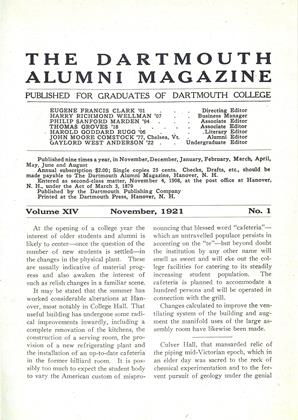The absolute democracy of Dartmouth has long been one of the college's proudest boasts. And in speaking of the Dartmouth democracy, an alumnus never failed to mention the position which the freshmen occupied.
The first-year man has never been treated with deference, nor should he be. To use the popular phrase, he has been made to know his place around college. Yet he has never been treated with mere tolerance as is somewhat the case at many large institutions. Freshman dormitories have no place at Dartmouth and unnecessary segregation has also been discountenanced. It has been a policy of the college to mix all the classes together in the dormitories. Such a plan has worked admirably for friendship among the men of different classes.
Two years ago with the large increase in the size of the entering class, compulsory freshman commons was adopted to relieve the eating situation. This has served another purpose of welding together as a unit an unwieldly class of about 600 men. When the first class of this size entered many grave doubts were entertained as to whether so large a number could be made a unit. Thanks largely to the freshman commons this question has been answered in the affirmative.
Last year a separate freshman chapel was inaugurated as the only means of relieving the congestion in Rollins. Unfortunately as it was, there was no other expedient. With the reseating of the chapel during the past summer the freshmen have again been brought in with the rest of the college.
One thing, minor perhaps, but none the less objectionable, has been started this fall, namely a separate freshman cheering section at football games. The idea, because of its novelty, appealed to a small yet powerful handful. The only plausible excuse for herding the freshmen to one end of the field is the now overworked apology, "to weld together the freshman class."
The freshman class needs no further welding. They are enough of a unit already. The link to be welded together is the one joining the freshmen to the rest of the college. They should be made to feel that they are a part of the college, and there is no better way to do this than on such occasions to mix the students as much as possible. So far the only result of this scheme has been a display of immaturity on the part of a few freshman wits, an exhibition which would leave anything but a favorable impression on visitors. In separating the freshmen in this way the upperclassmen must take the blame for such things. What is now needed is not an amalgamation of the freshmen, but of the freshmen with the rest of the college.
 View Full Issue
View Full Issue
More From This Issue
-
 Article
ArticleTHE UNDERGRADUATE'S RELATIONSHIP TO THE COLLEGE
November 1921 By ERNEST MARTIN HOPKINS -
 Article
ArticleAt the opening of a college year the
November 1921 -
 Sports
SportsFOOTBALL
November 1921 -
 Article
ArticleTWO DISTINGUISHED VERMONT ALUMNI
November 1921 By JAMES FAIRBANKS COLBY '72 -
 Article
ArticleMEMORIAL FIELD FAST BECOMING A REALITY
November 1921 -
 Class Notes
Class NotesCLASS OF 1905
November 1921 By Fletcher Hale







